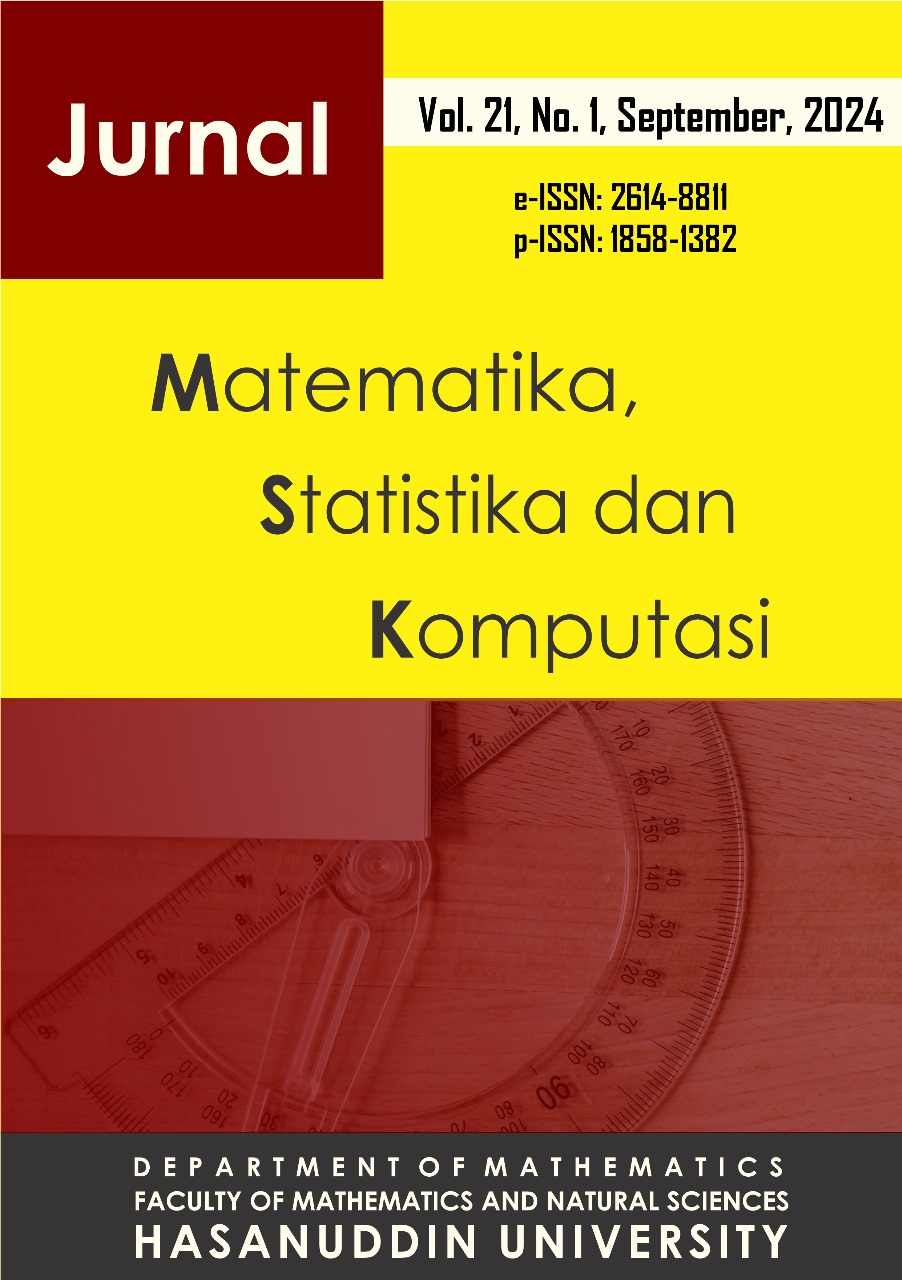Small Area Estimation for Percentage of Out-of-School Children Aged 7-17 Years in Sumatera Island, 2023
DOI:
https://doi.org/10.20956/j.v21i1.36043Keywords:
out-of-school children, small area estimation, hierarchical bayes betaAbstract
Ensuring the quality of education is a fundamental commitment towards achieving sustainable development goals (SDGs). One effective strategy to enhance education quality is addressing the high number of children out of school. More precise district/city-level data on the percentage of out-of-school children needs to be provided. Estimation results from Susenas data show that Sumatra Island has the highest proportion of districts/cities with a Relative Standard Error (RSE) of over 25% compared to other islands in Indonesia. Therefore, this study applies Hierarchical Bayes (HB) Beta method by utilizing accompanying variables. The research reveals that the HB Beta estimator is the most effective in estimating the percentage of out-of-school children aged 7—17 years at the district/city level on Sumatra Island. The Small Area Estimation (SAE) model offers a more precise estimate than the direct estimator. Furthermore, there are 25 districts/cities with a high percentage of children aged 7—17 years who are not in school, with the majority located in the southern region of Sumatra Island
References
Australian Bureau of Statistics, 2021. Confidentiality and Relative Standard Error. https://www.abs.gov.au/statistics/microdata-tablebuilder/tablebuilder/confidentiality-and-relative-standard-error#cite-window2
Badan Pusat Statistik, 2024. Angka Anak Tidak Sekolah Menurut Jenjang Pendidikan dan Kelompok Pengeluaran, 2022-2023. https://www.bps.go.id/id/statistics-table/2/MTk4OCMy/angka-anak-tidak-sekolah-menurut-jenjang-pendidikan-dan-kelompok-pengeluaran.html
Bappenas. 2024a. Metadata Indikator SDGs. https://sdgs.bappenas.go.id/metadata-indikator-sdgs/
Bappenas, 2024b. Sustainable Development Goals 4 : Pendidikan Berkualitas. https://sdgs.bappenas.go.id/17-goals/goal-4/
Box, G., & Tiao, G. 1992. Bayesian Inference in Statistical Analysis. John Wiley & Sons Ltd. https://doi.org/10.1002/9781118033197
Eurostat, 2019. Guidelines on Small Area Estimation For City Statistics and other functional geographies. European Union.
Firmando, G., & Ubaidillah, A., 2021. Pendugaan Area Kecil Untuk Angka Partisipasi Kasar Pendidikan Dasar Dan Menengah Tingkat Kabupaten/Kota Di Provinsi Jawa Tengah Tahun 2018. Seminar Nasional Official Statistics, 2020(1), 651–661. https://doi.org/https://doi.org/10.34123/semnasoffstat.v2020i1.466
Gu, H., & Ozturk, U., 2016. Technology, enrollment gender gap and the impact of social norms in rural China. China Agricultural Economic Review, 8(2), 335–344. http://dx.doi.org/10.1108/ CAER-01-2016-0016
Hakim, A., 2020. Faktor Penyebab Anak Putus Sekolah. Jurnal Pendidikan, 21(2), 122–132. https://doi.org/10.33830/jp.v21i2.907.2020
Ikhsan, E., Ratu, N. Y., & Nurizza, W. A. 2019. Estimasi Small Area Estimation Angka Partisipasi Kasar Di Perguruan Tinggi Pulau Kalimantan Tahun 2018. Prosiding Seminar Nasional Matematika, Statistika Dan Aplikasinya, 1, 82–88. https://jurnal.fmipa.unmul.ac.id/index.php/SNMSA/article/view/530
Kiong, J. F., 2023. The Impact of Technology on Education: A Case Study of Schools. Journal of Education Review Provision, 2(2), 43–47. https://doi.org/10.55885/jerp.v2i2.153
Lanyasunya, R., Ngala, F. B. J. A., & Tikoko, B., 2023. Relationship between ecological, economic, conflict, socio-cultural factor and enrolment of girls in rural public primary schools in Samburu County, Kenya. Journal of Education and Learning, 2(1), 154–160. https://doi.org/10.51317/jel.v2i1.454
Liang, X., Kamata, A., & Li, J., 2020. Hierarchical Bayes Approach to Estimate the Treatment Effect for Randomized Controlled Trials. Educational and Psychological Measurement, 80(6), 1090–1114. https://doi.org/10.1177/0013164420909885
Liu, B., 2009. Hierarchical Bayes Estimation And Empirical Best Prediction Of Small Area Proportions [University of Maryland]. https://drum.lib.umd.edu/bitstream/handle/1903/9149/liu_umd_0117e_10245.pdf?sequence=1
Maghfirah, D. A., 2019. The Determinant Factors of Dop Out Students at High School/Vocational School Level in Mataram City. Jurnal Kebijakan Pendidikan, 8(3), 215–222. https://doi.org/10.21831/sakp.v8i3.15862
Malik, N. F. J., Hoyyi, A., & Ispriyanti, D., 2014. Pendugaan Angka Putus Sekolah Di Kabupaten Semarang Dengan Metode Prediksi Tak Bias Linier Terbaik Empirik Pada Model Pendugaan Area Kecil. Jurnal Gaussian, 3(2), 101–110. https://doi.org/10.14710/j.gauss.3.1.101 - 110
Muhardi, 2004. Kontribusi Pendidikan Dalam Meningkatkan Kualitas Bangsa Indonesia. MIMBAR : Jurnal Sosial Dan Pembangunan, XX(4), 478–492. https://doi.org/10.29313/mimbar.v20i4.153
Mukherjee, M., 2012. Do Better Roads Increase School Enrollment? Evidence from a Unique Road Policy in India. SSRN Electronic Journal. https://doi.org/10.2139/ssrn.2207761
Nations, U. 2023. UNESCO: 250 million children now out of school. https://news.un.org/en/story/2023/09/1140882
Noviani, A., 2016. Small Area Estimation dengan Pendekatan Hierarchical Bayesian Neural Network Untuk Kasus Anak Putus Sekolah dari Rumah Tangga Miskin di Provinsi Jawa Timur. Thesis. https://repository.its.ac.id/1470/
Nurjanah, S., 2024. Factors Affecting Gross Enrollment Rates in Higher Education in Indonesia. International Journal of Applied and Advanced Multidisciplinary Research, 2(3), 243–258. https://doi.org/10.59890/ijaamr.v2i3.1566
Putri, S. P. O., 2023. Pengaruh Bencana Alam Terhadap Putus Sekolah di Indonesia. EDUCATIONIST: Journal of Educational and Cultural Studies, 2(2), 79–93. https://jurnal.litnuspublisher.com/index.php/jecs/article/view/170
Rao, J. N. ., & Molina, I., 2015. Small Area Estimation. John Wiley & Sons Ltd.
Raya, U., 2021. Akses Pendidikan Dasar Bagi Semua Anak. https://sikompak.bappenas.go.id/pembelajaran/view/40/id/materi_belajar/Strategi Tata Kelola Penanganan Anak Tidak Sekolah di Wilayah Dukungan KOMPAK/download.pdf
Rudji, H., 2023. Analisis Kondisi Demografi, Ekonomi dan Lingkungan pada Anak Putus Sekolah di Kecamatan Banawa Kabupaten Donggala (Studi Kasus Jenjang Pendidikan Sekolah Menengah Pertama). Jurnal Kolaboratif Sains, 6(6), 519–526. https://doi.org/10.56338/jks.v6i6.3672
Soetrisnaadisendjaja, D., & Sari, N., 2019. Fenomena Anak Putus Sekolah di Kawasan Industri Kota Cilegon. Hermeneutika : Jurnal Hermeneutika, 5(2), 89. https://doi.org/10.30870/hermeneutika.v5i2.7383
Yamashita, T., Yamashita, K., & Kamimura, R., 2007. A stepwise AIC method for variable selection in linear regression. Communications in Statistics - Theory and Methods, 36(13), 2395–2403. https://doi.org/10.1080/03610920701215639
Zainuri, M., Matsum, J. H., & Thomas, Y., 2020. Tingkat Pendapatan, sosial, Budaya dan Jarak Rumah dengan Sekolah sebagai Faktor Penyebab Anak Putus Sekolah. Jurnal Pendidikan Dan Pembelajaran Khatulistiwa, 3(10), 1–15. https://jurnal.untan.ac.id/index.php/jpdpb/article/download/6812/7556
Zimmerman, F. J., 2001. Determinants of school enrollment and performance in Bulgaria: The role of income among the poor and rich. Contemporary Economic Policy, 19(1), 87–98. https://doi.org/10.1111/j.1465-7287.2001.tb00052.x
Downloads
Published
How to Cite
Issue
Section
License
Copyright (c) 2024 Jurnal Matematika, Statistika dan Komputasi

This work is licensed under a Creative Commons Attribution 4.0 International License.

This work is licensed under a Creative Commons Attribution 4.0 International License.
Jurnal Matematika, Statistika dan Komputasi is an Open Access journal, all articles are distributed under the terms of the Creative Commons Attribution License, allowing third parties to copy and redistribute the material in any medium or format, transform, and build upon the material, provided the original work is properly cited and states its license. This license allows authors and readers to use all articles, data sets, graphics and appendices in data mining applications, search engines, web sites, blogs and other platforms by providing appropriate reference.







